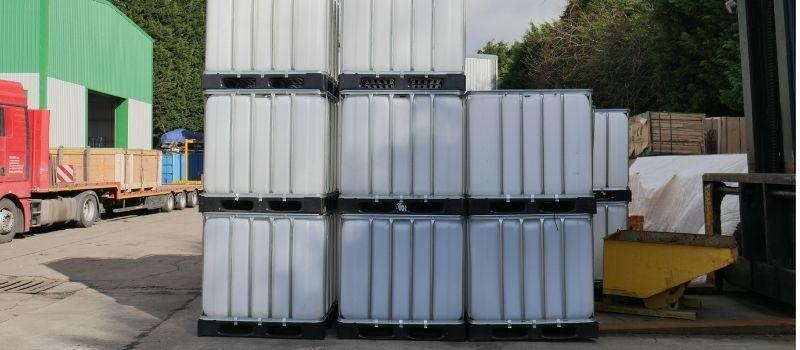You have probably walked past IBCs dozens of times in your day-to-day life without realising, because they are such a popular item.
Here at Direct Water Tanks, we get a bit excited about IBCs and love nothing more than spreading as much information about them as we can.
We have discussed unconventional uses of IBCs, cleaning your IBC and even differences between Grade A and Grade B IBCs. Today, we thought we would look at the history of IBCs and the material used to manufacture an IBC.
A brief history of IBCs
In 1992, a manufacturing firm employee called Olivier J. L. D’Hollander, was looking for an alternative way of storing liquids. The item he created to solve his problem was an IBC. D’Hollander went on to patent his original idea in 1993.
Shortly after companies started manufacturing their own versions of an IBC. They became the most common container used to transport and store liquids. Over time their uses have developed, adapting to a changing manufacturing and industrial market.
Since the manufacturing of the first IBC, there have been many adaptations. Challenges such as food contamination led to an IBC designed to meet specific food safety requirements. Another issue that was spotted early on in the life of the original IBC was that mixtures would settle at the bottom of the containers. To prevent this happening, IBC manufacturers created an IBC with a bigger opening so a mixer could go into the IBC and mix the liquids inside. IBCs have proved to be adaptable since their invention.
Materials used for each part
Container
When manufacturing IBC containers, the material most often used is high-density polyethene (HDPE). Manufacturers use HDPE for several reasons, these include:
- Lightweight but strong – it takes a lot to damage an IBC
- Weather-resistant – will stand strong against all the weather conditions the UK faces
- Resistant against mold and rotting
Considering the containers play a crucial role in the life of an IBC, it makes sense to make them using the most resilient materials.
Outer cage
The outer cage is typically made of strong materials that help protect the IBC container. Steel and iron are the most common materials used to manufacture the outer cage. Due to the environment IBCs are often used in, protecting them by using heavy-duty material extends the life span of both the IBC and the contents stored inside of it.
For hazardous materials, you can cover your IBC in a sheet of steel. This type of outer cage will completely cover the IBC and protect the surrounding area from any risk of contamination
Vales and smaller parts
The valves and smaller parts on IBCs are made using polypropylene. Manufacturers choose to use polypropylene because it is an inexpensive material but is extremely strong and flexible. It is also resistant to various chemicals which makes it ideal for use on an IBC.
Pallets
A pallet is there to supply support and protection for an IBC and its contents. The IBC will be placed on the pallet which is used to help transport the IBC. The pallet has forklift entry points which enables the IBC to be moved with ease.
You will find that most pallets use:
- steel
- plastic
- timber
These are strong materials that can safely hold a full IBC and they won’t be damaged by poor weather conditions; this is why they are so common in the manufacturing of pallets.
What is the manufacturing process?
The bottle itself is blow moulded, this involves heated plastic being blown into a mould cavity to create a hollow object.
Raw plastic is heated, then it’s formed into a parison. Next, the plastic parison is secured to the top of the mould. Finally, it is air blown down onto the plastic parison, stretching it across the interior walls of the mould cavity.
You can see just how bottle is made here.
An example of how the frame for an IBC is made can be seen here.
The question, ‘what are IBCs are made of?’, may have not been at the top of your get to know list but now you have the answers that you didn’t know you needed.
If you’d like to find out more about IBCs, please contact our sales team on 01777 858009 or email sales@kingfisherdirect.co.uk.

